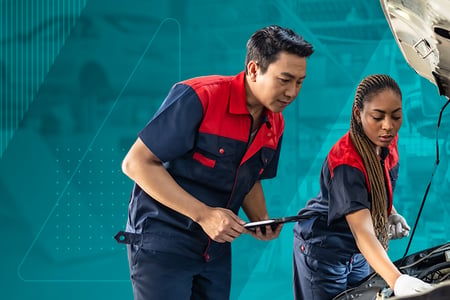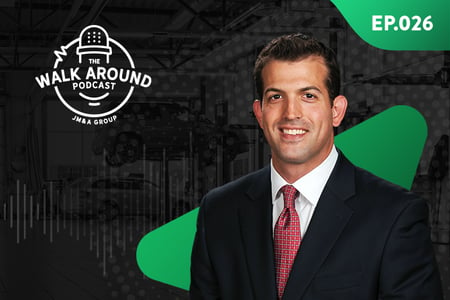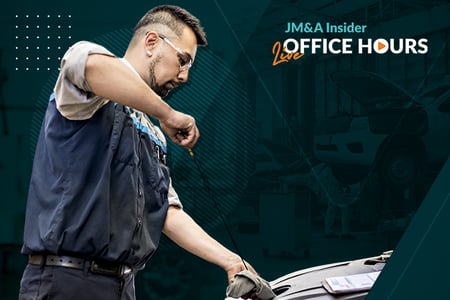Rolling Out an Effective Fixed Operations Change Management Program
Could your dealership be doing better in its fixed operations services, from inspections and repairs to part sales? In nearly all cases, the answer will be yes. There is always a chance to boost profit margins, increase efficiency and handle each job in a more consistent and customer-centric way that will improve the overall performance of your dealership.
Committing to making fixed operations improvement a concrete goal for your business is the first step, especially knowing that change management can be a difficult process at any company, whatever its size or industry. Designing impactful goals that fit your overall objectives is essential, as is rolling the strategy out in a way that employees will respond to.
It’s okay to admit that your dealership may be stagnant, relying on longstanding practices that often prove hard to replace and update. With that said, there are ways to break out of those patterns and turn your fixed operations department into a well-tuned machine as well as a bigger contributor to the overall bottom line. Following a few recommended fixed operations practices can make this important process go smoothly, and more importantly, become a sustainable change for your business.
Focus on changes that make a major impact
With so many options to consider, it’s important to focus on initiatives that will make the largest positive difference for your fixed operations teams and the dealership as a whole. When there are clear and measurable advantages to your strategy, there's a greater opportunity for buy-in at all levels and for progress to be made.
This dedication to the most meaningful elements of transformation also means you can focus on fewer big shifts at once and roll out a more comprehensive plan over time. With the proper oversight, leadership and training, your dealership will evolve in ways that will help retain customers and drive profits.
So, what kind of changes make the biggest impact in the service department? Shifting customer service strategies is a great example, as the resulting effects can immediately improve satisfaction and lead to better long-term retention. The fact is, customers' expectations are being shaped by the service provided by convenient, online-first retail experiences. Taking the traditional approach for customer service will no longer impress shoppers — fixed operations personnel must deliver excellence.
Today's customer service offerings should be:
- Valuable, saving people time and effort
- Transparent, with the whole process laid out in advance
- Trustworthy, meaning there are no hidden fees or sudden changes
- Frictionless, to suit the convenient experiences available online
- Highly personalized, realizing that each person's situation is unique
Implementing these new customer care priorities in the service department can be part of an overall transformation that will help fixed operations income stay strong, providing a reliable foundation for the dealership as a whole.
Encourage your employees to share their feedback
For organizational change to get traction within your dealership, your employees must be on board with the new processes you’re implementing. These are the personnel who will have to carry out the new directives every day, and their level of engagement and buy-in can make or break the project.
Park Hotel Group's Aaron Lim, writing for the LinkedIn Pulse blog, stressed the importance of hearing out every employee who will be impacted by a new process. The two-way communications that occur at the start of a transformation process are vital, with fixed operations managers laying out the reasons why change is necessary and what form it will take, allowing employees to share their perspectives and ideas.
People must be able to speak to their supervisors and overall dealership management about the current state of the process and what needs to happen to make the transformation successful. This means listening to their ideas and concerns. When employees understand that their questions and input will be heard and taken into account, change will start to feel like something they are a part of rather than a thing that is happening to them.
Ensure departmental leaders are on board
Think about implementing a change to the way service tasks are prioritized within your dealership. The plan may be meticulously designed with data in mind to maximize each employee's bottom-line contributions, but if supervisors aren't enforcing the new strategy, it will be near impossible to get technicians to follow it. Buy-in from departmental leaders is a part of making change feel natural rather than forced.
Talent management practices that focus on supervisors can make new practices easier to implement for everyone. Encouraging service department professionals to rethink the way they handle essential tasks, such as customer service, is far simpler when their managers have already been sold on the value of the plan.
LinkedIn's Workplace Learning Report revealed that 36% of millennial employees, ages 22-37, would commit more to educating themselves if that effort was recognized by their supervisors. Using managerial support to get millennials on board with change should be a priority, because according to Automotive News, Cox's Dealership Staffing Survey revealed young millennials, ages 22-28, are 10 percentage points more likely than older peers to want dealership work. Furthermore, these young millennials are interested in serving as technicians, the backbone of the fixed operations team.
Collaborate with experts
Effective fixed operations change does not have to come entirely from your dealership's internal stakeholders. An expert consulting engagement, designed with your dealership's specific requirements in mind, may be the perfect choice to get started on this important process. It's natural to wonder where to start with organizational transformation, or how to make the changes stick. An infusion of industry expertise can make the difference.
A comprehensive and tailored engagement means hands-on talent development for your staff, with each person learning not only what new practices they will be expected to embrace, but the overall effect of the differences on the business as a whole. Change can be hard to start and tough to sustain, but there's no need to go it alone.
Check out JM&A Group's fixed operations offerings and discover valuable next steps for your dealership.








